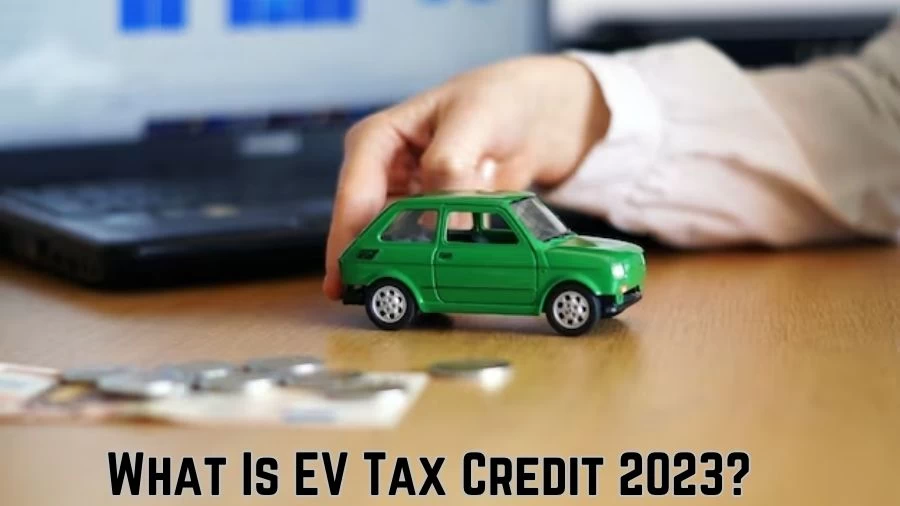
What is EV Tax Credit 2023? How Does the EV Tax Credit Work?
The EV Tax Credit 2023 provides nonrefundable tax benefits of up to $7,500 for new electric or plug-in hybrid vehicles, including a potential $4,000 credit for pre-owned EVs, based on income and vehicle criteria.
by Sangamithra
Updated Aug 28, 2023
On This Page
What is EV Tax Credit 2023?
The electric vehicle tax credit, known as the EV credit, is a nonrefundable tax benefit provided to individuals who acquire eligible electric or plug-in hybrid vehicles. Nonrefundable tax credits reduce the amount of taxes you owe by the equivalent credit value. This implies that while the credit can significantly decrease your tax obligation, you won't receive any excess amount as a tax refund.
Recently adjusted by the Inflation Reduction Act for the years 2023 through 2032, this tax incentive permits a maximum credit of $7,500 for new electric vehicles, and a potential of up to $4,000 (limited to 30% of the purchase price) for pre-owned electric vehicles. Each vehicle is eligible for a single credit claim per taxpayer. The specifics of this credit are outlined in section 30D of the Tax Code.
This credit aims to incentivize the adoption of eco-friendly transportation options, promoting the use of electric and fuel cell vehicles to reduce carbon emissions. The tax credit serves as a financial incentive for consumers to embrace cleaner and more sustainable modes of transportation, contributing to environmental conservation and energy efficiency goals.
How Does the EV Tax Credit Work?
The EV tax credit operates based on specific criteria to provide tax benefits to eligible individuals purchasing electric or plug-in hybrid vehicles. Qualification involves meeting income thresholds and adhering to IRS guidelines encompassing vehicle specifications and price limits. Notably, recent revisions under the Inflation Reduction Act have expanded credit accessibility for used EVs and introduced income and price caps.
Used EVs meeting battery capacity criteria, being at least two years old, and costing $25,000 or less can now garner up to $4,000 credit. The credit's applicability to new vehicles is tied to manufacturer-defined MSRP limits, while modified adjusted gross income (MAGI) restrictions also apply.
Vehicles with North American assembly, VIN-recorded, are eligible, and from 2024 onwards, the credit can be transferred to dealers to lower vehicle prices directly. Further IRS and Treasury Department guidance is anticipated.
How to Claim $7500 EV Tax Credit?
Claiming the $7500 EV tax credit involves several steps:
Eligibility Check: Ensure that you meet the eligibility criteria, including purchasing a new qualifying electric vehicle, using it primarily for personal use, and having a modified Adjusted Gross Income (AGI) below the specified limits.
Purchase a Qualifying Vehicle: Buy a new plug-in Electric Vehicle (EV) or Fuel Cell Electric Vehicle (FCV) that meets the requirements for the tax credit.
Gather Necessary Information: Collect important information, such as your vehicle's VIN (Vehicle Identification Number) and the manufacturer's certification statement indicating that the vehicle qualifies for the credit.
Complete Form 8936: Fill out IRS Form 8936, titled "Qualified Plug-in Electric Drive Motor Vehicle Credit," which is specifically designed for claiming the EV tax credit. The form calculates the amount of credit you're eligible for.
Include the Form with Your Tax Return: Attach Form 8936 to your federal income tax return when you file it for the applicable tax year. Make sure all information is accurate and complete.
File Your Tax Return: Submit your tax return by the deadline, which is typically April 15th unless extended.
Claim the Credit: The credit will be applied to your tax liability, reducing the amount of taxes you owe by up to $7500.
Keep Records: Retain all relevant documentation, including Form 8936 and the manufacturer's certification statement, for your records.
Consult a Professional: If you're unsure about any part of the process, consider consulting a tax professional or accountant to ensure accurate completion and submission of the necessary forms.
Inflation Reduction Act EV Tax Credit
The legislation known as the Inflation Reduction Act of 2022 has brought about changes to the regulations surrounding the $7500 EV tax credit applicable to vehicle purchases spanning from 2023 to 2032. To be eligible for this credit, it's necessary to acquire a new plug-in electric vehicle (EV) or fuel cell electric vehicle (FCV) intended for personal use, not for resale purposes.
Additionally, the vehicle must primarily be utilized within the United States, and your modified adjusted gross income (AGI) must not surpass specified limits:
- $300,000 for married couples filing jointly
- $225,000 for heads of households
- $150,000 for other filers
The IRS is actively working on the implementation of the Inflation Reduction Act of 2022, a substantial legislative measure with implications for individuals, businesses, tax-exempt organizations, and governmental entities.
EV Tax Credit Income Limit 2023
For the 2023 tax year and onwards, the income limits that determine eligibility for the EV tax credit are as follows:
- For married couples filing jointly: Modified Adjusted Gross Income (MAGI) must be $300,000 or less.
- For individuals classified as heads of households: MAGI must be $225,000 or less.
- For all other filers: MAGI must be $150,000 or less.
Meeting these income thresholds is essential to qualify for the EV tax credit when purchasing a new, qualified plug-in electric vehicle (EV) or fuel cell electric vehicle (FCV). It's important to note that exceeding these income limits could result in ineligibility for claiming the tax credit.
The EV tax credit aims to encourage the adoption of environmentally friendly vehicles by providing financial incentives to eligible taxpayers, and understanding the income limits is a crucial factor in determining eligibility for this credit.
IRS EV Tax Credit 2023
- The IRS EV Tax Credit amount for 2023 is determined by the vehicle's placement in service, regardless of its purchase date.
- Vehicles placed in service between January 1 and April 17, 2023, qualify for a credit that includes a base amount of $2,500.
- An additional $417 is added for vehicles with a battery capacity of at least 7 kilowatt hours, and an extra $417 for each kilowatt hour beyond 5 kilowatt hours.
- The total credit can reach up to $7,500 for vehicles placed in service during this period.
- The minimum credit available is $3,751, which applies to vehicles with a battery capacity of 7 kilowatt hours.
- Vehicles placed in service after April 18, 2023, must meet existing criteria and new requirements related to critical minerals and battery components.
- For vehicles meeting only the critical minerals or battery components requirement, the credit is $3,750.
- Vehicles meeting both requirements can qualify for the full credit of $7,500.
- Vehicles that do not fulfill these criteria are not eligible for the IRS EV Tax Credit in 2023.
Federal EV Tax Credit 2023
The Federal EV Tax Credit, updated under the Inflation Reduction Act for the period 2023 to 2032, offers a revised tax advantage. This entails a highest potential credit of $7,500 for new electric vehicles (EVs) and a capped credit of up to $4,000, limited to 30% of the vehicle's purchase price, for pre-owned EVs. It's important to note that taxpayers are eligible for a single credit per vehicle.
The adjustments to this tax credit aim to incentivize the adoption of electric vehicles by providing financial relief to consumers who choose eco-friendly transportation options. The changes seek to accommodate inflation and evolving market dynamics while maintaining the goal of promoting sustainable mobility choices.
Cars That Qualify for EV Tax Credit
The implementation of critical mineral and battery sourcing regulations will influence the eligibility of numerous vehicles for credit. The IRS encourages taxpayers to utilize the tool on the FuelEconomy.gov site to access the latest details on qualifying models. By using filters like purchase scenario, model year, and vehicle type, you can ascertain a car's eligibility based on its delivery date.
Effective July 20, 2023, the subsequent fully electric and plug-in hybrid vehicles qualify for a complete or partial tax credit if they are delivered on or after April 18, 2023:
|
Car Make and Model |
Tax Credit Amount |
MSRP Limit |
|
BMW |
||
|
X5 xDrive50e (2024) |
$3,750. |
$80,000. |
|
Cadillac |
||
|
Lyriq (2023-2024) |
$7,500. |
$80,000. |
|
Chevrolet |
||
|
Bolt (2022-2023) |
$7,500. |
$55,000. |
|
Bolt EUV (2022-2023) |
$7,500. |
$55,000. |
|
Blazer (2024) |
$7,500. |
$80,000. |
|
Equinox (2024) |
$7,500. |
$80,000. |
|
Silverado (2024) |
$7,500. |
$80,000. |
|
Chrysler |
||
|
Pacifica (2022-2023) |
$7,500. |
$80,000. |
|
Ford |
||
|
Escape (2022-2023) |
$3,750. |
$80,000. |
|
E-Transit (2022-2023) |
$3,750. |
$80,000. |
|
F-150 Lightning (2022-2023) |
$7,500. |
$80,000. |
|
Mustang Mach-E (2022-2023) |
$3,750. |
$80,000. |
|
Jeep |
||
|
Grand Cherokee PHEV 4xe (2022-2023) |
$3,750. |
$80,000. |
|
Wrangler PHEV 4xe (2022-2023) |
$3,750. |
$80,000. |
|
Lincoln |
||
|
Aviator Grand Touring (2022-2023) |
$7,500. |
$80,000. |
|
Corsair Grand Touring (2022-2023) |
$3,750. |
$80,000. |
|
Rivian |
||
|
R1S (2023) |
$3,750. |
$80,000. |
|
R1T (2023) |
$3,750. |
$80,000. |
|
Tesla |
||
|
Model 3 Standard Range RWD (2022–2023) |
$7,500. |
$55,000. |
|
Model 3 Performance (2022–2023) |
$7,500. |
$55,000. |
|
Model Y Performance (2022–2023) |
$7,500. |
$80,000. |
|
Model Y AWD (2022–2023) |
$7,500. |
$80,000. |
|
Model Y Long Range AWD (2022–2023) |
$7,500. |
$80,000. |
|
Model 3 Long Range AWD (2023) |
$7,500. |
$55,000. |
|
Volkswagen |
||
|
ID.4 Pro (2023) |
$7,500. |
$80,000. |
|
ID.4 Pro S (2023) |
$7,500. |
$80,000. |
|
ID.4 Pro S Plus (2023) |
$7,500. |
$80,000. |
|
ID.4 AWD Pro (2023) |
$7,500. |
$80,000. |
|
ID.4 AWD Pro S (2023) |
$7,500. |
$80,000. |
|
ID.4 AWD Pro S Plus (2023) |
$7,500. |
$80,000. |
|
ID.4 S (2023) |
$7,500. |
$80,000. |
|
ID.4 Standard (2023) |
$7,500. |
$80,000. |
As per the agency's guidelines, you typically claim the clean vehicle tax credit for the tax year when the vehicle is delivered to you, not the year of purchase. For instance, if you bought a qualifying EV in 2023 but receive it in 2024, you must claim the credit on your 2024 tax return. Conversely, if you purchase and receive a qualifying vehicle in the same calendar year, you can claim the tax credit on your 2023 tax return.
In 2024, taxpayers might also have the option to transfer the credit directly to the dealership for an immediate car discount, bypassing the need to wait for the next calendar year to claim it on their returns. The IRS is anticipated to provide further guidance on this credit flexibility in the forthcoming months.
Which Cars are Now Ineligible for Any Credit?
Several vehicles that met the requirements at the beginning of 2023 no longer meet the updated criteria. You can only receive a credit for one of these vehicles if you acquired it by April 17, 2023, not just if you purchased it by that date.
Vehicles not eligible for tax credit include:
- Audi Q5 TFSI e Quattro
- BMW 330e
- BMW X5 xDrive45e
- Genesis Electrified GV70
- Nissan Leaf S, S Plus, SL Plus, SV and SV Plus
- Volvo S60 (PHEV), Extended Range and T8 Recharge (Extended Range)
If you bought an electric vehicle in a previous year but didn't claim the credit, you might still be eligible to do so by amending your tax return for the year in which you took ownership of the vehicle.
What is EV Tax Credit 2023 - FAQ
1. What is the EV tax credit for 2023?
The EV tax credit is a nonrefundable tax benefit designed to encourage the adoption of electric and hybrid vehicles by providing financial incentives to eligible buyers.
2. How does the EV tax credit work?
The EV tax credit works by reducing the amount of taxes owed based on the purchase of qualified electric or plug-in hybrid vehicles, subject to income and vehicle criteria.
3. What income limits apply to the EV tax credit in 2023?
For 2023, income limits for the EV tax credit are $300,000 for married couples filing jointly, $225,000 for heads of households, and $150,000 for other filers.
4. Which vehicles qualify for the EV tax credit in 2023?
Electric and plug-in hybrid vehicles meeting specific criteria, such as battery capacity and critical mineral sourcing, are eligible for the EV tax credit in 2023.
5. Can I claim the EV tax credit for vehicles delivered in a different year than purchased?
Yes, the EV tax credit is claimed based on the year the vehicle is delivered, not the purchase year, aligning with IRS guidelines and eligibility requirements.




